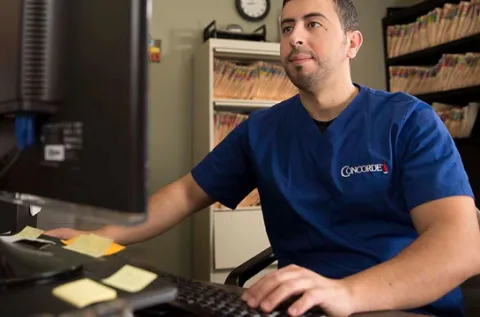Concorde Staff

With the help of medical office administrators, health care practices have what it takes to run smoothly and efficiently. Playing both a front-facing and behind-the-scenes role, they carry out a wide range of tasks. Due to their work, doctors and nurses can focus on the provision side of health care operations, allowing patients to enjoy optimal experiences and outcomes.
The Primary Duties of Medical Office Administrators
It's challenging to pinpoint the exact responsibilities of medical office administration. That's partly because duties may depend on the specific employment setting, but it's also due to the broad scope of the profession. The common objective of the job is to make a health facility run efficiently, to which end, medical office administrators may perform any or all of the following duties:
- Scheduling appointments and follow-ups.
- Gathering patient histories and concerns before appointments.
- Receiving patients and checking them in.
- Answering telephone calls and email correspondence.
- Managing patient charts and records.
- Receiving and processing insurance claims.
- Coordinating physicians' and nurses' orders.
- Transferring results and other data to the appropriate recipients.
- Ordering, stocking, and allocating office supplies.
- Operating office equipment and other hardware.
- Maintaining a tidy office.
How To Pursue a Career as a Medical Office Administrator

Things You Don't Know About MOAs
For people interested in training to become a medical office administrator, we recommend following the steps outlined below:
1. Complete Your Education
Most states don't have specific education requirements for medical office administrators, so the employer sets preferences in that regard. Ordinarily, a college degree isn't necessary to enter the profession. Still, students will need to earn at least a high school diploma or equivalent to qualify for the next stage in training to become an administrator.
2. Complete a Medical Office Administrator Program
Instead of an associate, undergraduate, or graduate degree, most candidates complete a formal medical office administration training program at an accredited institution. You can complete a training program in as little as eight months, depending on the content. In general, expect the course to cover a wide range of topics relevant to the profession, including:
- Office procedures.
- Computer and office applications.
- Terminology.
- Communications.
- Claims processing.
- Medical coding.
Looking for a program that offers externships or hands-on learning opportunities to gain experience in a real medical office while training is a good idea. By completing an externship, students can apply their learning to practice and improve their chances of full-time employment through practical knowledge and references.
3. Gain Relevant Experience
Having completed their program, candidates may qualify for a host of entry-level medical office administrator positions. A wide range of roles can qualify as relevant experience, as there's significant overlap between the job of a medical office administrator and that of other administrative professionals. Seek out opportunities that require you to perform similar duties and use similar tools, such as:
- Receptionist.
- Administrative assistant.
- Clerk.
- Secretary.
4. Get Certified as a Medical Office Administrator
Certification is optional, but it may improve candidacy for a medical office administrator role. It's a professional credential that validates knowledge, competencies, and expertise so employers can look to it to verify qualifications.
One certification to consider is the National Certified Medical Office Assistant offered by the National Center for Competency Testing. To qualify for the NCMOA, students must have at least a diploma demonstrating completion of a relevant program and a minimum of one year of full-time experience in a relevant role within the past five years. Earning the certification requires a passing score on the 150-question NCMOA exam, which takes three hours .
Essential Skills for Medical Office Administrators

8 Impressive Skills To List on Your Resume
Medical office administrators also need to develop skills that allow them to stand out against other candidates and excel in their roles. Below are the essential skills for medical office administration:
Interpersonal Skills
Interpersonal skills are qualities that allow you to engage effectively with others. A medical office administrator acts as a hub around which the operations of a medical facility revolve. To health care consumers, they are often the first face of the patient experience, delivering the initial interaction that puts them at ease and prepares them for what's ahead. To a medical provider, the administrator is a facilitator of information and essential resources, ensuring they have the information, materials, and supplies to do their job effectively. Given all that interaction, the ability to interact at all levels is crucial.
Communication
As the hub of operations, a medical office administrator must possess strong verbal and written communication skills so that all interested parties have the information they need to fulfill their roles. Patients will frequently call and write with questions and comments, and the administrator ensures they receive the knowledge they seek. Physicians and nurses will also need information regarding scheduling and patient charts, which the administrator handles.
Organization
Staying organized means keeping things in order. Medical office administrators handle a wide variety of information and documents, much of which is confidential, not to mention a broad array of tasks. Therefore, they need to be capable of devising a logical system for managing their workload so that nothing gets overlooked.
Technological Proficiency
Medical office administrators use many tools in the course of the workday. They will probably work with an electronic health record system to schedule appointments and update patient information daily. Likely, too, they'll use spreadsheets, text documents, and emails, so familiarity with common productivity suites is a must. On top of that, they should be able to operate a VoIP phone, fax machine, printer, and copier.
Problem Solving
It's not uncommon for medical office administrators to face certain challenges in a workday. Scheduling problems, for example, may result in challenging coordination of appointments, and emotional patients can lead to conflicts with personnel. The administrator is among the front line of solution seekers for such problems.
Work Environment for Medical Office Administrators

Should You Become a Medical Office Administrator or Medical Assistant?
Medical office administrators work in various health care settings, big and small. The most common are:
- Private physicians' practices: According to the United States Bureau of Labor Statistics (BLS), most medical office administrators work in physicians' offices . Private practices typically have a small staff, so administrators commonly take on an expanded role that includes activities ordinarily handled by other professionals, such as medical coding.
- Hospitals: Hospital settings ordinarily employ a larger staff of administrators so duties may be more defined and streamlined. Coding, for example, will probably be the responsibility of dedicated medical coders so administrators can concentrate on the more traditional aspects of the job, such as receiving patients, taking calls, and scheduling appointments. Because hospitals provide emergency and round-the-clock care, administrators often handle unscheduled visits and occasionally work night, weekend, or holiday shifts.
- Outpatient care centers: An outpatient care center is any medical facility or department that provides care to patients who don't require overnight stays. For medical office administrators, that often means clinics. Clinic appointments are ordinarily arranged well in advance, so the scheduling duties tend to be more routine and predictable.
Generally speaking, medical office administration is a full-time job, amounting to 40 hours per week. Overtime opportunities may also be available.
Job Outlook for Medical Office Administrators
The BLS groups medical office administrators under the broad category of medical assistants and projects that the employment of medical assistants will grow by 14% from 2022 to 2032, which is considerably faster than the 3% average for all occupations . As with many medical and medical-adjacent careers, the BLS attributes the likelihood of growth to the ongoing need for health services by an aging baby boomer population. Hospitals and other facilities will continue to need medical office administrators to serve such a large population of health care consumers.
When ready to start training to become a medical office administrator, students need the right program to get started. We encourage you to schedule a tour of your nearest Concorde campus to determine whether our diploma program is right for you. Students can complete the program in as little as eight months, including an externship to gain the hands-on experience necessary to succeed. Get in touch today and find out how Concorde can prepare you for your career.
"Your Path To Becoming a Medical Office Assistant," National Center for Competency Training, https://www.ncctinc.com/certifications/medical-office-assistant
"Your Path To Becoming a Medical Office Assistant," National Center for Competency Training, https://www.ncctinc.com/certifications/medical-office-assistant
"Your Path To Becoming a Medical Office Assistant," National Center for Competency Training, https://www.ncctinc.com/certifications/medical-office-assistant

Take The Next Step Towards a Brighter Future
Interested in learning more about our Medical Office Administration program? We have a Concorde representative ready to talk about what matters most to you. Get answers about start dates, curriculum, financial aid, scholarships and more!






